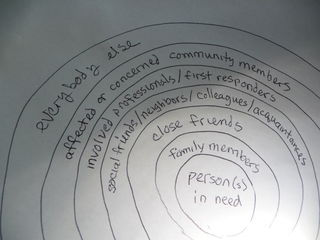Friends
10 Tips for Offering Real Comfort to People in Crisis
Dumping out is easy. Comfort In requires care and sensitivity.
Posted October 4, 2018 Reviewed by Ekua Hagan
If you’re like most people, you often don’t know what to say when someone is enduring a crisis or tragedy. Words are often inadequate. Reassurances ring hollow. Platitudes fail. Advice often falls flat. You might consider avoiding the person altogether, and yet, you know that’s the opposite of supportive.

The previous post explored Susan Silk’s Ring Theory, which proposes a pecking order, using concentric rings. The most affected people inhabit the inner rings, where support is more needed and deserved. The rule is Comfort In; Dump Out.
To clarify this pecking order, imagine training a spotlight on the center ring, where support should be most focused. As the rings span ever outward, they are less bright, signifying that those people are less affected and require less support. If you want to complain or seek comfort, it is only appropriate to impose upon people in rings that are dimmer than yours. The spotlight also demonstrates a key component of the pecking order: Never steal the spotlight from someone more affected than you!
Dump Out is easy. It’s okay to be messy. But sending Comfort In and keeping the spotlight centered requires more care and sensitivity. Whether your interests are professional or personal, here are 10 tips for getting it right:
1. Get oriented. Determine who is in the center ring. If it’s not you, determine which ring you inhabit. Also determine who inhabits the rest of the rings, and their positions relative to yours.
2. Err on the side of caution. If you’re not sure how someone is affected, put them in a more inner circle to remind you to simply offer comfort, not dumping.

3. Keep the spotlight where it belongs. Train it on the center ring. See how brightly lit the central people are? Now imagine how the light gets more diffuse as the rings span ever outward. Take note of the people who are more brightly lit than you so you know where to aim your comfort. Now, notice who‘s in your ring and who is more dimly lit than you, so you know who you can appropriately dump on and elicit the support you might need.
4. Don’t steal the spotlight. When offering comfort in, don’t try to fix it or give advice, by pointing out silver linings, telling them to buck up, saying how it could be worse, or opining how to make it better. Do not talk about yourself--or anyone else. The more spotlight is on them, the more your focus belongs on them.

5. Keep it simple and honest. Express your sorrow, affirm their pain, admit that you can't find the words, and reassure them that you’ll keep them in your thoughts. “I’m so sorry.” “I can see that this is very hard on you.” "I don't know what to say." “I’m thinking of you often.”
6. Talk less; listen more. Listening is another way to keep the spotlight pointed to where it belongs. When you have sufficient time, gently and warmly ask him/her/them how they are really doing, and then sit and listen. You’re offering calm, quiet, compassionate companionship, which is immensely comforting. And they receive the therapeutic benefits of being able to tell their story, express emotions, and feel connected to a lifeline rather than isolated and alone.
7. Prepare to be dumped on. If the dump is from a person in a ring more brightly lit than yours, they are appropriately dumping out, and you can be a compassionate, listening presence for them. If the dump is from someone in a ring more dimly lit than yours, kindly ask them to refrain from burdening you and remind them to dump into outer circles.
8. Keep it real. When someone is appropriately dumping, continue to face them/ maintain eye contact, especially when they are talking about tough topics or painful feelings. Whether you’re on the phone with them or in person, don’t multitask, as this shifts the spotlight, even if ever so slightly. Offering true comfort requires giving all your attention. If they go deep, see it as an honor and a sign that they feel safely held by you.

9. Make concrete offers of assistance. Don’t say, “Let me know if you need anything,” as this is an empty promise and puts the onus on them. Instead, offer what specifically suits their needs and what you can realistically follow through on, such as running errands, doing household chores, providing transportation. “Can I look after your kids Friday evening/ Saturday morning/ during your next appointment?” “Can I keep you company on Monday evening?” “Can I bring you lasagna on Tuesday?” “Can I walk your dog every Wednesday?” “Can I mow your lawn this Thursday?” Or if it’s reasonable, just show up with kid-friendly plans, hugs and tissues, lasagna on ice, walking shoes, or your lawnmower in tow. Your careful consideration of their needs is another way to keep the spotlight pointed where it belongs.
10. Share the concept of rings and spotlight with your friends, family, and caregivers. Knowing about Ring Theory and keeping the Spotlight Centered, you can all boost your confidence and competence as a support persons. During times of trouble, the more comfortable everyone can feel in the face of suffering, the more comforting you can be to each other. And that’s how getting comfortable translates into being comforting.
This post applies to supporting anyone enduring any hardship or tragedy. My next post spotlights an especially heart-wrenching tragedy — the death of a baby at any time during pregnancy or infancy — and details how to offer real comfort to bereaved parents, whether they are friends or family.




